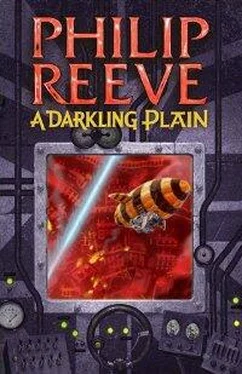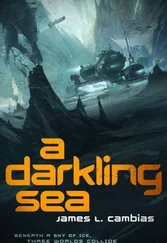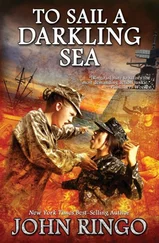Where the deep, twenty-year-old track marks of London cut through the Green Storm’s border, they had been filled with banks of earth, topped by stone-filled wicker gabions, iron huts, and rocket batteries. Ten years earlier a pack of harvester suburbs had tried to break through there, and their ruins had been added to the fortifications; upended sections of chassis and track, pierced with gun slits and painted with the angry slogans of the Storm: STOP THE CITIES! THE WORLD MADE GREEN AGAIN! WE SHALL WASH THE GOOD EARTH CLEAN IN THE BLOOD OF TRACTIONIST BARBARIANS!
In the rocket battery at Track Mark 16a sentry thought she heard the growl of land engines and went out onto the parapet to look, but all she could see was the mist. That morning’s patrols had reported all the barbarians sitting safe and snug and stationary on their own lines, almost like real people. The engines probably belonged to a Green Storm half-track taking soldiers out to some advance listening post in no-man’s-land. Poor devils. Sentry duty stank, and Track Mark 16 was a worthless sewer. The soldier went back inside, where there were hot noodles and a stove to sit beside, and letters from her family in Zhanskar.
Tom was dreaming of London when Wren came to wake him. In his dream, he had already reached the wreck site, and to his delight the old city was not nearly as badly damaged as he had feared. In fact, all that had changed was that Tier Two was open to the sky, and the sun shone brightly down into the streets of Bloomsbury, where Clytie Potts was waiting for him on the steps of the museum. “Why did you wait so long to come home?” she asked, taking his hand. “I didn’t know,” he said.
“Well, you’re here now,” she told him, leading him in through the familiar portico. The dinosaur skeletons in the main hall all turned their bony heads to look at him, and mooed their greetings. “Now you can get on with the rest of your life,” said Clytie. He looked past her and saw his own reflection in a sheet of ancient tinfoil that hung in one of the cabinets, and he was not old and ill-looking but well again, and young.
“Dad?” asked Clytie, turning into Wren, and he woke reluctantly to the stuffy dark of Harrowbarrow, groping for his green pills.
“Are you all right?” Wren asked him. “We’re nearly at the line. Wolf says to make ready…”
The thought that they would soon be leaving made Tom feel a little better; so did the pleasant memory of his dream. He dressed and followed Wren aft to the hangar near the suburb’s stern, where the Jenny Haniver sat waiting to resume her journey. Wolf met them there. “Get your stuff aboard,” he ordered. “Be ready to move out as soon as I come back.”
“Where are you going?” asked Tom, surprised that they were not to take off at once.
“To the bridge. We are not across the line yet, Herr Natsworthy. I am arranging for a little distraction so that the Mossies don’t spot us crossing.”
He left, hurrying forward along one of Harrowbarrow’s tubular streets. Tom and Wren stowed their bags in the Jenny’s gondola, then waited outside, standing close together in the noisy turmoil of the hangar. The note of the idling engines changed suddenly, rising from a murmur to a scream, and Wren grabbed at Tom for support as the suburb surged forward.
“What’s happening?”
Tom was not sure, but even in the windowless hangar there was an immense feeling of speed. With all its auxiliary engines churning, Harrowbarrow raced along the track mark, throwing up a thick bow wave of soil and vegetation as it rose to the surface. The startled Green Storm soldiers had time to fire off a few salvos of rockets, which burst harmlessly against the suburb’s armor. Then the barriers, the fortresses, and the rocket projectors were slammed aside as Harrowbarrow tore through the front line into Storm territory. Sally ports popped open in her flanks, and squads of fierce scavengers swarmed out with guns and knives and maces to attack the survivors scrambling from their dugouts. With a steep skirl of engines Harrowbarrow swung itself sideways, smashing the walls of the track mark down, toppling a watchtower.
A moment later Wolf ran into the hangar, shouting, “Go! Go!” and yelling orders in Roma and German to the men waiting by the hangar door controls. Heaving on brass handles, they started to haul the doors open. As smells of damp earth and cordite swilled into the hangar, Tom and Wren caught their first glimpse of what was happening outside. In the red glow of countless fires a battle was raging across the steep, mashed sides of the track mark. Harrowbarrow was still turning, so the scene slid past quickly, but there was time to see the flattened barracks blocks, the spiky tangles of barbed wire showing spidery against the flames, and the figures struggling and slithering and scrambling in the mud; the flash of gunfire; the glint of blades, the sliding, tumbling dead.
“Get aboard!” shouted Wolf, shoving Wren up the Jenny’s gangplank. “We must be well on our way before reinforcements arrive.”
“All this, just so we can cross the line?” cried Tom. “You never said—”
“I said I would get you across.” Wolf shrugged. “I did not say how. I thought you realized there would be a little unpleasantness involved.”
“But the truce …,” said Wren.
“The truce will hold; we’ve given them no reason to think we’re part of the Traktionstadtsgesellschaft…”
“All those poor people…”
Hurrying her onto the flight deck, Wolf grinned kindly at her, as if her softheartedness amused him. “They’re not people, Wren; only Mossies. They chose to live like animals on the bare earth. Now they will die like animals…”
Harrowbarrow had turned right around now; its bows pointed back the way it had come; its stern, and the open doors of the hangar, pointed east into Storm country. Tom was working frantically at the Jenny’s controls. Wren felt the engines coming to life, but she could not hear them above the louder roar of Harrowbarrow’s own engines and the battle going on outside. A few bullets sparked against the frame of the hangar doors, but most of the Green Storm defenses had been silenced. Wolf slapped Tom hard between the shoulder blades and shouted, “Go! Fly! Now!” Tom glanced at Wren and then, grabbing the control levers, he cut the power to the Jenny’s mooring clamps and took her quickly up and forward, out of the hangar, eastward along the foggy floor of the track mark.
Wren left the flight deck and ran aft to the stern cabin.
Through the long window there she had her last sight of Harrowbarrow, a leviathan wreathed in fog and battle smoke, rearing up to gobble and crush another Green Storm fortress before it sank down into the track mark and drove westward. The Jenny was flying fast, the branches of trees in the floor of the track mark scratching and snatching at the gondola’s keel. Soon even the glow of the fires faded into the fog astern, and there was no sound but the familiar purr of the Jeunet-Carot engines.
“I doubt any Mossies noticed us leave,” said Wolf. How long had he been standing behind her? Wren turned. He was watching her kindly, eager to allay her fears. “If they did, my boys will have killed them by now. Hausdorfer will smash a few more of their defenses and then head back into the badlands before reinforcements come. The Storm will think it was only a greedy scavenger town, hungry for scrap metal and Mossie blood. They won’t come looking for us.”
“You didn’t tell us,” said Wren coldly. “You said it would be easy to cross the line! You didn’t say we’d have to fight a battle.”
“That was easy,” said Wolf. “You can’t even imagine what a real battle’s like, Fräulein Aviatrix.”
Читать дальше












